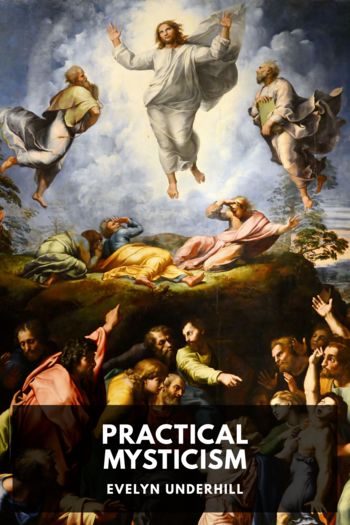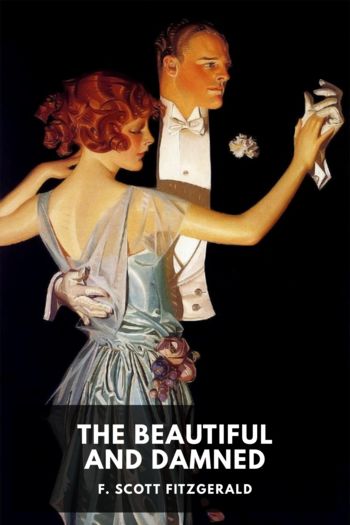Practical Mysticism by Evelyn Underhill (classic reads .txt) 📕

- Author: Evelyn Underhill
Book online «Practical Mysticism by Evelyn Underhill (classic reads .txt) 📕». Author Evelyn Underhill
Therefore nothing can really be mean, nothing despicable; nothing, however perverted, irredeemable. The blasphemous otherworldliness of the false mystic who conceives of matter as an evil thing and flies from its “deceits,” is corrected by this loving sight. Hence, the more beautiful and noble a thing appears to us, the more we love it—so much the more truly do we see it: for then we perceive within it the Divine ardour surging up towards expression, and share that simplicity and purity of vision in which most saints and some poets see all things “as they are in God.”
Lastly, this love-driven world of duration—this work within which the Divine Artist passionately and patiently expresses His infinite dream under finite forms—is held in another, mightier embrace. It is “kept,” says Julian. Paradoxically, the perpetual changeful energies of love and creation which inspire it are gathered up and made complete within the unchanging fact of Being: the Eternal and Absolute, within which the world of things is set as the tree is set in the supporting Earth, the enfolding air. There, finally, is the rock and refuge of the seeking consciousness wearied by the ceaseless process of the flux. There that flux exists in its wholeness, “all at once”; in a manner which we can never comprehend, but which in hours of withdrawal we may sometimes taste and feel. It is in man’s moments of contact with this, when he penetrates beyond all images, however lovely, however significant, to that ineffable awareness which the mystics call “Naked Contemplation”—since it is stripped of all the clothing with which reason and imagination drape and disguise both our devils and our gods—that the hunger and thirst of the heart is satisfied, and we receive indeed an assurance of ultimate Reality. This assurance is not the cool conclusion of a successful argument. It is rather the seizing at last of Something which we have ever felt near us and enticing us: the unspeakably simple because completely inclusive solution of all the puzzles of life.
As, then, you gave yourself to the broken-up yet actual reality of the natural world, in order that it might give itself to you, and your possession of its secret was achieved, first by surrender of selfhood, next by a diligent thrusting out of your attention, last by a union of love; so now by a repetition upon fresh levels of that same process, you are to mount up to higher unions still. Held tight as it seems to you in the finite, committed to the perpetual rhythmic changes, the unceasing flux of “natural” life—compelled to pass on from state to state, to grow, to age, to die—there is yet, as you discovered in the first exercise of recollection, something in you which endures through and therefore transcends this world of change. This inhabitant, this mobile spirit, can spread and merge in the general consciousness, and gather itself again to one intense point of personality. It has too an innate knowledge of—an instinct for—another, greater rhythm, another order of Reality, as yet outside its conscious field; or as we say, a capacity for the Infinite. This capacity, this unfulfilled craving, which the cunning mind of the practical man suppresses and disguises as best it can, is the source of all your unrest. More, it is the true origin of all your best loves and enthusiasms, the inspiring cause of your heroisms and achievements; which are but oblique and tentative efforts to still that strange hunger for some final object of devotion, some completing and elucidating vision, some total self-donation, some great and perfect Act within which your little activity can be merged.
St. Thomas Aquinas says, that a man is only withheld from this desired vision of the Divine Essence, this discovery of the Pure Act (which indeed is everywhere pressing in on him and supporting him), by the apparent necessity which he is under of turning to bodily images, of breaking up his continuous and living intuition into Conceptual scraps; in other words, because he cannot live the life of sensation without thought. But it is not the man, it is merely his mental machinery which is under this “necessity.” This it is which translates, analyses, incorporates in finite images the boundless perceptions of the spirit: passing through its prism the White Light of Reality, and shattering it to a succession of coloured rays. Therefore the man who would know the Divine Secret must unshackle himself more thoroughly than ever before from the tyranny of the image-making power. As it is not by the methods of the laboratory that we learn to know life, so it is not by the methods of the intellect that we learn to know God.
“For of all other creatures and their works,” says the author of The Cloud of Unknowing, “yea, and of the works of God’s self, may a man through grace have full-head of knowing, and well he can think of them: but of God Himself can no man think. And therefore I would leave all that thing that I can think, and choose to my love that thing that I cannot think. For why; He may well be loved, but not thought. By love may He be gotten and holden; but by thought never.”
“Gotten and holden”: homely words, that suggest rather the outstretching of the hand to take something lying at your very gates, than the long outward journey or terrific ascent of the contemplative soul. Reality indeed, the mystics say, is “near and far”; far from our thoughts, but saturating and supporting our lives. Nothing would be nearer, nothing dearer, nothing sweeter, were the doors of our perception truly cleansed. You have then but to focus attention upon your own deep reality, “realise your own soul,” in order to find it. “We dwell in Him and He in us”: you participate in the Eternal Order now. The





Comments (0)